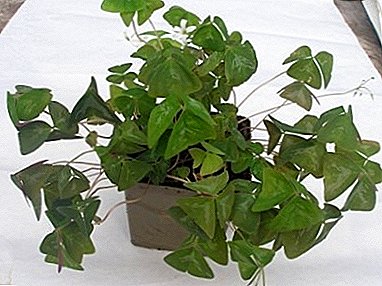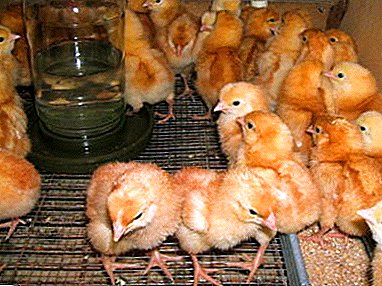 Cumin - a unique plant, better known as spice, is used not only in the culinary direction, but also as a therapeutic agent for gastrointestinal diseases.
Cumin - a unique plant, better known as spice, is used not only in the culinary direction, but also as a therapeutic agent for gastrointestinal diseases.
About its beneficial effects on the body and the rules of application will be discussed below.
Botanical description of the plant
Cumin is a herbaceous biennial or long-term member of the Umbrella family. Occurs in temperate regions of Europe and Asia.
The rhizome of grass can reach 20 cm in length. Powerful, spindly, fleshy. Leaf plates are arranged on the stem next. As you move to the top of the leaves become smaller. Have a double-or threefold shape. In the upper part of the leaves are sitting on shortened petioles with the vagina, in the lower part are long-leaflets.
Did you know? Esoteric apply cumin as an ingredient for a love potion. In part, it can be argued that such a potion can have a stimulating effect on the victim, since the plant is a natural aphrodisiac that arouses carnal desire.
In the first year after seed germination, a basal leafy rosette is formed; in the second, stem growth is observed.  He might be:
He might be:
- smooth;
- low knotted;
- round.
Inside the stem is hollow. Its shape is bent.
The grass enters the flowering phase in the second year of life. This phase begins in June - July. At the end of each shoot, an umbrella-shaped complex inflorescence is formed. The inflorescence can be with or without a wrapper. Flowers small, pyatilepestkovye. Painted white.
The seed is an oblong templar, divided into two semi-fruits. Fruits ripen in July - August.
Chemical and vitamin composition
The composition of the royal cumin includes a number of vitamins.
Among them:
- thiamine;
- riboflavin;
- pyridoxine;
- beta carotene;
- vitamin C;
- vitamins D, E;
- phylloquinone.
Important! It is impossible to stock up with vitamins, they need to be consumed regularly. After ingestion, the vitamins are removed from it after 6 hours.
A significant part is occupied by such chemical elements as:
- potassium;
- calcium;
- magnesium;
- iron;
- phosphorus;
- essential oils;
- technical oils.

Medicinal properties of cumin
Cumin - an effective folk remedy, which is used as an adjunct to the main therapy for diseases of the intestinal tract. Actively used for constipation, chronic colitis, gastritis, and with high acidity.
Rich in vitamin and mineral composition helps to restore intestinal mucous, allows you to get rid of flatulence and diarrhea by accelerating the elimination of toxins from the body naturally.
Learn more about what cumin is good for the human body.
In addition, most of the elements contained in the seeds, stimulates the strengthening of the walls of internal organs and blood vessels, restores normal acidity, which has a positive effect on the condition of patients suffering from GERD. This disease is chronic and is characterized by spontaneous periodic throwing of gastric juice and / or duodenal contents into the esophagus, which leads to an ulcer of its lower part.
The same applies to erosive gastritis with constantly increased acidity. In cases of mucous lesions, the essential oils of cumin seed effectively restore their walls, rendering an enveloping effect.
Stimulation of the immune system can effectively protect the body from the attack of harmful microorganisms from the outside at the time of the greatest weakening after the stages of exacerbation of intestinal diseases.
The essential oils contained in the seeds, stimulate the production of hormones, which allows you to restore a stable endocrine system in PMS in women and disorders of potency in men. Enzymes have a stimulating effect with reduced lactation.
By restoring hormones and stimulating the production of oxytocin, the uterine contraction can be accelerated in the postpartum period.  Cumin is actively used for colds, accompanied by cough and asthma. It has an expectorant, thinning effect in the presence of obstructive bronchitis and relieves bronchospasm with a dry cough.
Cumin is actively used for colds, accompanied by cough and asthma. It has an expectorant, thinning effect in the presence of obstructive bronchitis and relieves bronchospasm with a dry cough.
The active effect on the urinary system contributes to the rapid abstraction of excess fluid. Fermented elements contribute to the dissolution of kidney stones.
Rich vitamin composition provides for the restoration of tissues of organs at the cellular level. A beneficial effect on the nervous system, which improves the quality of sleep, reduces anxiety.
Caraway oil is also used for skin fungi, ulcers, boils and acne externally. It has a disinfecting effect, controlling the production of sebum.
Cumin oil is also used externally in children with no age limit in the presence of fungal skin diseases or pinworm worm infections. From the age of 6, it is used to treat various colds, and is also used as an immunomodulatory component.
Important! Although there is no age limit for external use, in any case, you must first carry out the test, dropping 1 drop of the used remedy on the wrist. If after 1 hour no redness, itching, puffiness is detected, it can be applied on the affected area.
Taking cumin stimulates the thymus gland, which directly affects the body's performance of immune cells. It has anesthetic and sedative effect. 
How to apply cumin to the stomach and intestines
In the fight against disorders of the digestive functions, infusions and decoctions of cumin seed are used.
Cumin infusion
For infusion will require:
- 300 g of cumin seeds;
- 1 liter of boiling water.
 Raw materials pour boiling water and insist 12 hours. It is better to brew infusion for the night. In the morning, strain and dilute 1: 2 with water. Drink this infusion need 1-2 weeks, three times a day, 100 ml. To improve the taste, you can use honey or dilute with tea. Children from 6 to 14 years old reduce the dosage by half.
Raw materials pour boiling water and insist 12 hours. It is better to brew infusion for the night. In the morning, strain and dilute 1: 2 with water. Drink this infusion need 1-2 weeks, three times a day, 100 ml. To improve the taste, you can use honey or dilute with tea. Children from 6 to 14 years old reduce the dosage by half.Cumin broth
To make a decoction you will need:
- 2 tbsp. l seeds;
- 400 ml of water.
Water should be brought to a boil and place grains in it. After that, the container is placed in a water bath, steamed for 15 minutes. The resulting composition insist 45 minutes, drink 2 tbsp. l 3 times a day. Children - 1 tbsp. l 2-3 times a day.  You can increase the efficiency of decoction by adding coriander to it. To prepare the decoction with coriander, the seeds of both plants are taken in a 1: 1 ratio. So, 400 ml of water will need 1 tbsp. l cumin seeds and coriander. The method of preparation is the same. Take this broth to 1 tbsp. l 3 times a day, for children - 0.5 st. l
You can increase the efficiency of decoction by adding coriander to it. To prepare the decoction with coriander, the seeds of both plants are taken in a 1: 1 ratio. So, 400 ml of water will need 1 tbsp. l cumin seeds and coriander. The method of preparation is the same. Take this broth to 1 tbsp. l 3 times a day, for children - 0.5 st. l
In the year you need to hold several courses. This approach is especially effective in chronic gastrointestinal diseases. For example, the course is 14 days. After 20-30 days it is repeated again. Children with the aim of improving immunity and prevention of gastrointestinal diseases will be 2-3 courses per year for a period of 7-10 days.
Learn, than flour and oil of black caraway are useful to the person.
How to choose and store cumin
Buying cumin, pay attention to the degree of dryness. The mass should be crumbly, and the grains themselves are whole. Also worth paying attention to the smell of spices. It should be spicy, spicy, with musky notes, rich.  Keep the spice to dry glassware, hermetically sealed. Storage space should be dark, with a humidity not higher than 50%. The temperature regime does not matter much, but should not be below + 6 ° C. The shelf life under all conditions is not more than 5 years.
Keep the spice to dry glassware, hermetically sealed. Storage space should be dark, with a humidity not higher than 50%. The temperature regime does not matter much, but should not be below + 6 ° C. The shelf life under all conditions is not more than 5 years.
Contraindications and possible side effects
The use of cumin is contraindicated:
- with vomiting;
- with individual intolerance;
- allergy to herbs similar to cumin;
- children under 6 years old;
- diabetes;
- pregnancy;
- angioedema;
- period after a heart attack.
Important! When treating oncology with chemotherapeutic procedures, the use of cumin can significantly reduce the therapeutic effect of them.
As side effects when applied in and out can manifest itself:
- nausea;
- vomiting;
- diarrhea;
- headaches;
- gloomy;
- urticaria, itching, swelling.
The harm to the seeds of the plant in question can be done if the recommended dose is exceeded, or if the person does not know that he has an intolerance to this product.  Cumin is not only a spice, but also a drug that allows you to restore the functionality of the immune system and the gastric tract. If the reception is agreed with the doctor and all the requirements regarding the dosages used are met, no side effects occur.
Cumin is not only a spice, but also a drug that allows you to restore the functionality of the immune system and the gastric tract. If the reception is agreed with the doctor and all the requirements regarding the dosages used are met, no side effects occur.












